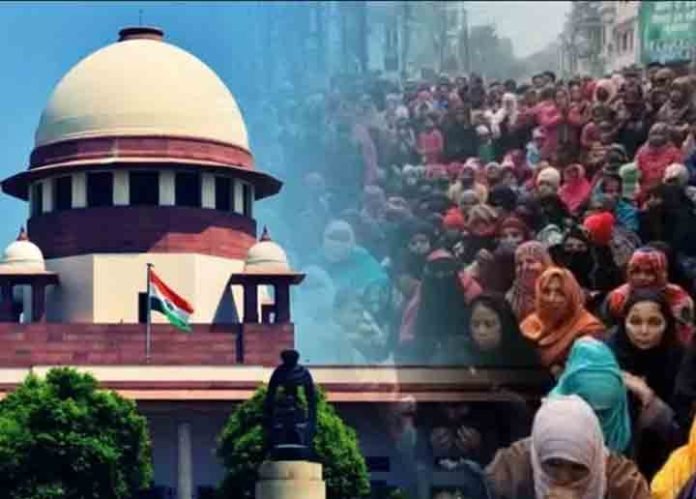INVC NEWS
New Delhi – In a historic ruling, the Supreme Court of India has upheld the constitutionality of Section 6A of the Citizenship Act, 1955. This decision, delivered by a 5-judge bench led by Chief Justice DY Chandrachud, has brought significant relief to millions of people in Assam who have faced uncertainty regarding their citizenship status for decades. The verdict, delivered with a 4-1 majority, is a monumental victory for the rights of Assam’s citizens, affirming the legal provisions laid out in the Assam Accord of 1985.
The Constitutional Battle Over Section 6A
The crux of the legal debate was the constitutionality of Section 6A of the Citizenship Act, which was added as part of the Assam Accord, an agreement between the Indian government and Assam’s leaders to resolve the issue of illegal immigrants following the Bangladesh Liberation War. Section 6A offers Indian citizenship to refugees who entered Assam from East Pakistan (now Bangladesh) before March 25, 1971.
The Assam Sanmilita Mahasangha, an organization representing various indigenous groups, challenged the provision, arguing that it violated the constitutional rights of the people of Assam. They sought to limit citizenship to individuals who had settled in Assam before January 1, 1966, as is the case in other Indian states. However, the Supreme Court dismissed these claims, stating that Section 6A was consistent with the Assam Accord, which provides a political and legal solution to the refugee crisis in Assam.
Why the Supreme Court’s Decision is a Victory for Assam
The court’s ruling is not just a legal win; it is a humanitarian victory for millions of people in Assam who have lived under the shadow of potential deportation or loss of citizenship. For decades, the fate of these individuals has been uncertain, and many faced the threat of being labeled foreigners despite having lived in the state for generations.
Chief Justice DY Chandrachud and Justices Surya Kant, MM Sundresh, and Manoj Mishra ruled in favor of the provision, asserting that Section 6A was a legal response to the political and social challenges faced by Assam due to mass migration from Bangladesh during and after the war of independence. Justice Chandrachud, in his judgment, emphasized that the 25th March 1971 cutoff date was a reasonable demarcation point to address the unique challenges that Assam faced due to post-partition migration.
The ruling is significant not only because it resolves a long-standing legal battle, but it also secures the citizenship rights of millions of Assamese residents, both Muslims and non-Muslims, who were facing the possibility of statelessness.
The Role of Jamiat Ulema-e-Hind in the Legal Struggle
One of the key players in this legal victory is the Jamiat Ulema-e-Hind, which has been at the forefront of the fight to protect the citizenship rights of Assam’s residents. For over 15 years, Jamiat Ulema-e-Hind, under the leadership of Maulana Mahmood Asad Madani, fought the case in the Supreme Court, representing the interests of millions of people whose citizenship was in jeopardy.
The Jamiat Ulema-e-Hind’s state unit in Assam, led by Maulana Badruddin Ajmal, also played a pivotal role in the legal proceedings. The organization challenged the claims made by the Assam Sanmilita Mahasangha and argued that Section 6A was essential to preserving the rights of people who had been living in Assam for decades.
Maulana Mahmood Asad Madani, in response to the ruling, called it a milestone in the Jamiat Ulema-e-Hind’s long-standing struggle for justice in Assam. He pointed out that the organization had been actively working for over 70 years to protect the rights of the poor and marginalized in the state. This decision, according to Madani, would finally bring relief to those who had lost hope of ever being recognized as Indian citizens.
The Assam Accord and Its Implications
The Assam Accord was a watershed moment in the history of Assam. Signed on August 15, 1985, between the Indian government and the leaders of the Assam Movement, it was designed to end years of political agitation over the presence of illegal immigrants from Bangladesh. One of the key provisions of the Accord was the establishment of March 25, 1971, as the cutoff date for determining Indian citizenship for migrants in Assam.
Section 6A of the Citizenship Act, which was enacted as part of the Assam Accord, allows individuals who entered Assam before January 1, 1966, to be considered Indian citizens. Those who arrived between January 1, 1966, and March 25, 1971, were allowed to register as citizens after a period of 10 years, provided they met certain residency requirements.
This provision was seen as a compromise to balance the concerns of the indigenous Assamese population with the reality of the large numbers of refugees who had settled in the state following the Bangladesh Liberation War.
The Broader Impact on Assam’s Communities
The Supreme Court’s decision is not just a legal matter; it has profound implications for the social fabric of Assam. The state has long been a melting pot of different ethnicities, religions, and cultures, with a complex history of migration and settlement. The ruling affirms the diverse and multicultural nature of Assam, recognizing that different ethnic groups have a right to coexist without one being considered a threat to the other.
In his ruling, Chief Justice Chandrachud noted that the presence of different racial groups in a state does not constitute a violation of Article 29(1) of the Constitution, which guarantees the right to protect language, script, and culture. He stated that it is not enough to claim that one group’s cultural rights are under threat simply because another group is present. The burden of proof lies on the petitioner to demonstrate that their ability to protect their culture is being compromised.
Future of Citizenship Rights in Assam
While this ruling brings a sense of closure to one chapter of Assam’s complex citizenship saga, the issue of citizenship in Assam remains contentious. The National Register of Citizens (NRC), which aims to identify illegal immigrants, continues to be a source of tension and legal battles. The Jamiat Ulema-e-Hind, which has been actively involved in nine NRC-related cases in the Supreme Court, has vowed to continue its fight to ensure that the rights of Assam’s marginalized communities are protected.
Maulana Madani also pointed out that one of the organization’s previous victories was the recognition of panchayat link certificates for 4.8 million women in Assam, which allowed them to prove their citizenship. This decision had a significant impact on both Muslim and non-Muslim women in the state, and the Jamiat continues to advocate for the rights of those affected by the NRC process.
A Milestone for Assam’s Citizenship Rights
The Supreme Court’s decision to uphold Section 6A of the Citizenship Act is a major victory for human rights and justice in Assam. It brings long-awaited relief to millions who have faced decades of uncertainty, providing a legal framework that ensures their right to citizenship. With this ruling, the Jamiat Ulema-e-Hind has achieved a significant milestone in its constitutional battle, and it has renewed its commitment to continue fighting for the rights of Assam’s people in the courts.
















